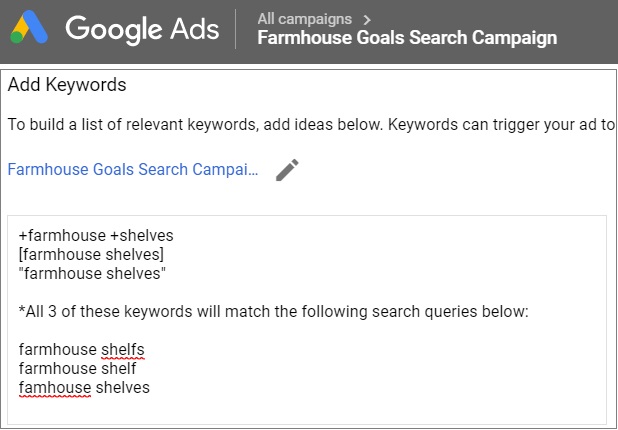When you get started with Google Ads search campaigns, two of the main things you need to learn are keyword match types and negative keywords. Once you understand the different types of keywords you can target, you need to know how Google AdWords keyword close variants can impact your campaign.
Google Ads Keyword Variations
What Are Keyword Close Variants?
The definition of keyword close variants in Google Ads has continuously changed since it was announced. The close variants of a keyword include its singular or plural forms, misspellings, keyword variations resulting from stemming, abbreviations, accents, and variations of the keyword you are targeting. It will impact your modified broad match keywords, phrase match keywords, and exact match keywords.
Can I Opt Out of Close Keyword Variants?
No. In the past, you could choose to include or exclude keyword variations. Today, you are automatically using close variants when you target keywords.
Examples of Close Variants
Exact Match Keywords and Close Variants
Let’s presume that a user searched for the term ‘Women’s dresses’ and you are targeting the exact match keyword of [womens dresses]. Some of the close variants of this keyword would be women dress, woman dresses, and womens dress.
Modified Broad Match Keywords and Close Variants
With the same search query, let’s presume and you are targeting the broad match modifier keyword of +womens +dresses. With close variants, that keyword would match search queries such as dress for women, womans best dresses, and women’s dreses.
Keyword Close Variants Best Practices
You can improve your Google Ads campaigns by understanding how to target keywords properly.
- Do not target misspellings in your Ad Groups.
- Do not create separate Ad Groups for misspellings or plurals.
- Never use accents when you are targeting keywords.
- Understand how keyword close variations will impact the keywords you are targeting.
Keyword Close Variants Focus on Intent
All of these words or phrases are either a misspelling or variation of the original keyword. Before displaying the results, Google tries to understand the intent of a user.
Similarly, a Google search for a phrase containing the word ‘consult’ would also bring in hits for stemmed keywords, such as consultant, consulting, etc.
Keyword Targeting in Google Ads
Keywords are the foundation of search advertising. Users enter search terms in Google all day. Advertisers bid on these keywords, and the winning bid gets a chance to display its ad. For years, Google worked on the principle of ‘exact match keyword targeting.’ Exact match essentially meant marketers could reach prospective customers only if the keyword they bid on exactly matched with the keyword typed in by the user. Since people regularly misspell words or enter plural versions, it’s helpful for advertisers and Google alike to have more advertisers enter every ad auction.
In Summary
You can avoid targeting every misspelling and plural variation of a keyword. In addition, you should learn to optimize for close variants of a keyword correctly. Google Ads close variants allow you to bid on one keyword and you will still match multiple variations of this keyword.






